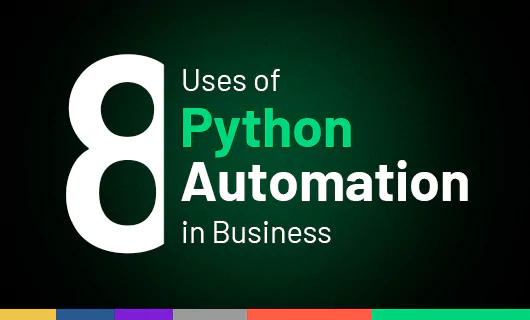So much good can be said about Python. And rightly so – it’s simple yet scalable, elegant yet effective, flexible yet robust. It became a go-to programming language for scientists working on machine learning-based AI projects and data analysis experts helping businesses make data-driven decisions. One of the prime reasons for Python’s popularity is its support for thousands of open-source libraries, which makes the language relevant across varied industries and applications. But is Python as good as they say for developing web-based apps? Let’s find out.
Is Python Good for Web Development?
Here’s the first clue – some of the biggest web brands, like YouTube, Netflix, and Instagram, implemented Python code into critical areas of their architecture. For example, YouTube’s content delivery system is based on it, and the majority of back-end infrastructure has been built with popular Python web frameworks like Django and Flask. That doesn’t mean, though, that Python programming language is always the best and only option for developing web applications. As with any technology, it has its share of shortcomings.
Pros of Using Python for Web Development
Here are some main advantages of using Python for web development:
Versatility and Flexibility
That’s one of the biggest strengths of Python. A dynamically typed language, Python is highly flexible and can be used for various web development tasks, including server-side scripting, web scraping, and data analytics. Python is also compatible with different operating systems, making it an ideal choice for Python Development Services focused on building web applications on varied platforms.
One of the major advantages of Python is its ability to integrate with other languages and technologies. Python can easily interface with C, C++, and Java and can be used alongside Apache, Nginx, and AWS. And due to its scalable nature, Python web development is an excellent choice for both basic and complex applications.
Large and Active Community
Python’s community is one of the largest and most active in the programming world. Thousands of experienced developers contribute to the Python community by creating and maintaining libraries, frameworks, and tools used in web development. This means that a vast array of resources is available to web developers, making it much easier for them to add Python to the project’s technology stack and build web apps.
Python’s large community is also known for being welcoming and supportive. New developers are encouraged to participate, and there are resources available for beginners who are just starting to learn this coding language.
Fast Development Cycles
Python’s agile and simple syntax, along with its vast library of pre-written code, make app scripting and software testing a breeze, allowing developers to prototype and iterate their applications quickly. Additionally, Python is one of the most rapidly developing coding languages, which makes it easier for web developers to be more productive and efficient in their work, resulting in faster development cycles and time to market, which is particularly beneficial for startups seeking a competitive advantage.
Extensive Library of Frameworks and Tools
With an abundantly rich ecosystem containing many frameworks and numerous dedicated tools, Python remains one of the most preferred technologies for web developers. Such easy access to pre-written code makes Python an excellent option for projects where time is of the essence. Python libraries and frameworks, such as Django, Flask, Pyramid, or TurboGears, can significantly speed up the development process without jeopardizing the end product’s performance.
Robust Security Features
Python offers several built-in security features that can be leveraged to ensure secure coding practices. For example, the language provides the ability to manage user sessions and account authorization, validate user input, and encrypt sensitive data. Furthermore, companies offering back-end development services can utilize Python’s standard libraries, which include modules for secure socket layer (SSL) encryption and hashing algorithms, which are critical for securing server-side web apps.
Cons of Using Python for Web Development
No technology is perfect, and neither is Python. Let’s look at the most evident disadvantages of Python programming.
Slower Performance Compared to Other Languages
Python is an interpreted language, meaning its code is executed directly without prior compilation into zeros and ones readable by the CPU. Instead, the Python interpreter reads and evaluates scripts line by line, translating them on-the-fly into byte code. This process contrasts with compiled languages such as C or C++, where the code is compiled into machine code first, and the resulting executable can be run directly by the computer.
Interpreted language like Python allows developers to write code and debug it much faster than its compiled counterparts. But it incurs a performance cost, as the interpreter needs time to do its job.
Limited Compatibility With Certain Technologies
Even though we’ve listed Python’s compatibility as one of the advantages, it may be limited under certain circumstances. In some scenarios, Python doesn’t cope well with Microsoft .NET, one of the most popular software development frameworks. Making the two work together is possible, but it requires additional provisions. Furthermore, Python isn’t exactly the right language for mobile development; it is much better suited for desktop applications and server-side scripting.
High Memory Consumption
Python is a memory-hungry beast; that’s a fact. In Object Oriented Programming languages, like Python, almost every element of the code (such as string, list, number, etc.) is considered an object that has to be allocated within the memory. Running out of RAM can pose an issue with more complex scripts executed, even though Python handles memory management quite well with its Garbage Collector algorithm. Nevertheless, as an Object Oriented Programming language, Python always requires a lot of memory space.
Difficulty in Finding Experienced Developers
While Python has a large and active community, finding an experienced developer can be challenging. It all depends on the location and current job market saturation. There may be areas where there is a shortage of seasoned professionals. Additionally, the high demand for Python web development specialists may drive up salaries, making it more difficult for companies to hire them. Python is widespread these days, but its popularity has surged only in the past few years. Simply there aren’t yet enough senior developers on the market to meet the ever-growing demand.

Where Is Python Used in Web Development?
Python is utilized in various fields of web application development, ranging from server-side programming to web scraping and data analytics. Here are some specific areas where Python is commonly used in web development:
Rapid Prototyping
Thanks to its accessibility, easy code refactoring, and rapid development time, Python is often used for the fast prototyping of web-based applications. It allows developers to bring their ideas to life and gain feedback quickly. With Python, many developers can build websites and app prototypes in a matter of hours or days, which is significantly faster than in many other languages.
Data-driven Web Applications
Python’s ability to handle large amounts of data and integrate with popular data analysis libraries like NumPy and pandas make it an excellent choice for building data-driven web applications. Python web frameworks offer a wide range of tools, including templates, routing, and ORM (Object-Relational Mapping) libraries, making it easy to connect to databases and work with data.
High-traffic Websites
Have you heard about Disqus? It’s a networked community platform and comments plugin used by hundreds of thousands of sites worldwide. The amount of HTTP requests Disqus has to handle is gigantic. And all of its back-end architecture has been built with Django, one of the most popular Python web frameworks. There are plenty of other examples of high-traffic websites based on Python. Its impressive scalability and access to a vast library of both micro frameworks and comprehensive, all-in-one solutions allow for developing websites of varied scale and scope.
Machine learning-powered Web Applications
Python has established itself as a powerhouse for machine learning and artificial intelligence applications. It offers a wide range of libraries and tools that can be used in multiple ways to develop ML models and integrate them into web applications. Some of the most popular libraries include TensorFlow, Keras, PyTorch, and Scikit-learn. These libraries make it easy for developers to build a web application that can process and analyze large amounts of data, make predictions, and provide user recommendations.
The Most Popular Python Frameworks for Web Development
Python has a variety of frameworks that can be used for web development, each with its strengths and weaknesses. The following list of web frameworks contains only the most popular examples.
Django
Django is a high-level web framework perfect for building complex, data-driven websites. It follows the model-template-view (MTV) architectural pattern and comes with many built-in functionalities, such as an ORM, templating engine, and an admin interface. Large organizations and startups often use Django to build scalable web development projects. The (already mentioned) Disqus, as well as Pinterest and Instagram, are powered by Django.
Flask
An exceptionally easy-to-learn and use for any aspiring web dev. Flask is a lightweight framework perfect for building small to medium-sized web applications and APIs. Flask comes with a minimal set of features, allowing developers to choose the necessary components and avoid unnecessary bloat. If you are learning Python and want to delve more into web development, install Flask and get to building a fully functional website straight away. Flask isn’t as scalable or robust as Django, but it contains all the important concepts that any Python developer would wish for. It can be ideal for smaller projects and inexperienced devs who have just started learning Python.
Pyramid
Pyramid is a highly flexible, open-source web framework designed to build complex web solutions. It is incredibly extensible and allows developers to choose the components necessary for their project requirements. Pyramid is well-suited for large-scale applications and can handle a wide range of use cases, including content management systems and e-commerce platforms.
TurboGears
TurboGears is a Python web framework that allows you to write significantly smaller, concise applications in Minimal mode or bigger, complex ones in Full Stack mode. TurboGears is known for its feature-complete and flexible nature, which allows it to scale to a full-stack solution for more complicated applications using TurboGears DevTools.
Is Python the Right Choice for Your Web Development Needs?
Python is currently considered one of the best programming languages for web development. Its extensive library of frameworks and tools, along with its large and active community, make it an attractive option for any organization looking to develop a Python web application quickly and efficiently. Python’s fast development cycles can help businesses save time and resources while allowing them to maintain a high level of software security. However, Python may not be the best choice for some web development projects, particularly those that require the highest performance or low memory consumption. Ultimately, the decision to use Python for web development will depend on each business’s specific needs and goals as well as the available resources and technical expertise of the software development company responsible for the project.





